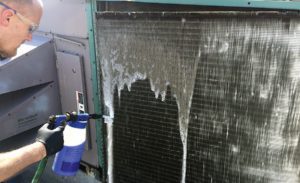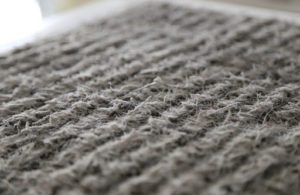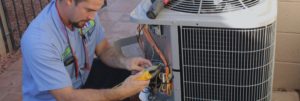The hard-working HVAC companies servicing Phoenix homes and businesses throughout the hot summers nearly always deal with the same seven problems. Central air conditioners are marvels of technology, but when one of these seven problems surfaces, not even the hardiest system will perform well.
Seven Causes & Repairs For a Broken Air Conditioner
If you’re asking yourself, “why won’t my air conditioner work”, you’ll find the following seven causes to be helpful in answering your question.
1. Refrigerant Leaks
Your AC system typically has around 10 pounds of liquid refrigerant in it. This continually loops between your condenser and evaporator coils to rid your space of heat and cool the interior air. The refrigerant should never “disappear,” and if it does, it will cause your AC not to work. So these signs of a refrigerant leak require immediate, professional intervention:
- Your home or business requires a very long time to cool off:
Low freon levels mean your system has less to work with, so the heat exchange takes much longer than it should.
- Warm air is coming from the supply vents and registers:
No matter how often your system turns on and off, without enough refrigerant it cannot remove heat from your home or office.
- You hear a hissing or bubbling sound:
Leaks come from punctures, holes or, rarely, loose fittings. The leaking refrigerant makes a hissing or bubbling sound (often at the condenser, the outside unit).
- Frozen evaporator coil (inside):
The coils are designed to absorb heat from air blowing over them; without enough refrigerant, they cannot absorb enough heat and freeze.
Amateurs cannot safely work with freon, and the leak needs to be found and fixed. Contact your Phoenix air conditioning repair professionals at ACE Home Services.
See also:
How to Tell if Your Air Conditioner Has a Freon Leak
Where do Freon Leaks Occur?
2. Dirty Coils

Regular maintenance can prevent some AC problems. A dirty condenser coil in your outside part of the central air conditioner can be fixed quickly, usually with just a garden hose. Having a fin comb to straighten bent coil fins is also helpful but not necessary.
If you feel comfortable cleaning the outside unit yourself, turn off power to the system at the circuit breaker near it, then remove the top panel of your condenser unit. You likely will see leaves, seeds, twigs, and other debris inside the unit. Each of these items can cause an AC not to work. Vacuum all that debris out if your air conditioner isn’t working; then try turning it on. The fins themselves can be hosed off, or you can purchase condenser coil cleaner for a more thorough job.
Indoors, the evaporator coils can be cleaned in two ways:
- With a commercial foaming spray cleaner, then gently wiped down with a clean rag;
- With a vacuum cleaner using its brush attachment.
Alternating between the two methods every three to six months is a good rule of thumb. Ideally, when your professional HVAC technician arrives for your annual HVAC tune-up, inspection, and cleaning, she or he will be happy to see you extended the life of your system with regular coil cleaning.
3. Electric Control Failure
Something as simple as a faulty circuit breaker could cause your whole air conditioning system to stop working. Electrical problems are high on the list of Phoenix air conditioning repair companies perform. At ACE Home Services we do not recommend that if your air conditioner won’t work you tinker with electrical issues; a mistake can be fatal.
The most common electrical control failures that make an air conditioner not to work are:
- Loose wires
From vibration, age or thermal expansion, wiring at terminal strips can loosen, causing electrical short circuits or power disruption.
- Wrong size fuses
Fuses can be confusing, but their amperage matters. If you tried to repair an AC problem yourself by replacing a fuse, you may have put in one that is rated too small for the power needs of the AC component.
- Dirty fuses
Accumulating dust can interfere with a fuse’s correct operation. With the power off, vacuum the fuse panel and around the blades touching each fuse end.
- Bad capacitor
A capacitor in an AC system is a bit like a battery, providing a sudden surge of power for start-up or to keep the parts running. A bad capacitor can interrupt proper operation and make your system unreliable.
Unusual issues include repeated tripping of the circuit breaker, indicating a major malfunction in your central air conditioning system and for it to no longer work. Leave it off and call for professional help. Another rare issue, after a Valley electrical storm, is a power outage that requires you to reset the circuit breaker for your AC, or minor flooding that overwhelms or short-circuits the outdoor condenser.
Long-term signs of electrical problems, your unit works then the air conditioning won’t work, are a slow rise in power consumption (check your electricity bills month to month) or an air conditioner that will not turn off, even when it reaches its set point.
4. Sensor Problems
In order for your Phoenix central air conditioner to work again, it needs to “know” air conditions, like temperature and humidity. It learns this through sensors, which can go bad.
Your coolant temperature sensor is located slightly above the evaporator coils in the interior portion of your system. This thermostatic sensor reads the flowing air temperature, so it signals the system to run until that temperature matches your set point (desired indoor temperature). If the sensor is touching the coils, skewed far away from them or is covered in dirt, it will not operate correctly.
Two signs of a sensor problem that cause an AC to not work right:
- Your system short-cycles: It turns on and off almost without stopping.
- Indoor air temperatures are not right: Either too hot or too cold.
5. Drainage Problems
Ridding your home of humidity is part of the marvel of central air conditioning. That excess water wrung out of the air has to go somewhere, which is why your system has a condensate drain. Water drips from your condenser into a drain pan, and then through a tube to a drain (or to the ground).
Think about the number of places something could go wrong in that flow:
- The pan can build up algae and mold;
- The tube can become clogged;
- The U-shaped drain trap can dry out;
- The collector pan can overflow.
This regular horror show can be averted. At ACE Home Services, many of our expert technicians report total system shutdowns over something as simple as a clogged drain tube, something we can fix in minutes; having your air conditioner working again. Regular maintenance of the drain pan and tube can keep the unwanted water flowing, keeping your home or office cool.
6. Frozen Coils
The condenser coils outside and the evaporator coils inside can both freeze causing the unit not to work. Before you spend money on evaporator coil replacement, please allow the technicians from ACE Home Services to examine your system. Frozen coils can result from several issues:
- Dirty coils prevent heat exchange;
- Dirty air filters inhibit airflow at the proper rate;
- Closed registers or dirty return air ducts make your system unbalanced;
- Low refrigerant levels decrease evaporator coil efficiency;
- Fan motor seizes, limiting airflow on the condenser.
Another sign of frozen coils, besides the obvious visible ice and frost on the coils, is warm air blowing from the registers. Never try to remove ice from the coils, as you could damage them. Turn your system off and let it thaw out, then see if the coils are dirty. If cleaning the coils does not remedy the problem, contact ACE Home Services.
7. Dirty Air Filters

One of the most common reasons for why an air conditioner won’t work is a dirty air filter. In order for your system to work properly, the filtration system must be clear of dirt and debris.
Without question, the easiest home remedy to a broken central air conditioner is to replace disposable air filters or clean permanent air filters.
The problem with a dirty air conditioner filter is that your system was balanced for a given air flow, and a clogged filter limits that flow. Limited airflow results in overheated parts, dirty ducts that require cleaning and early part failures. The cost of disposable filters is minimal compared to the cost to have an emergency service call or, worse, parts replaced.
Signs you have dirty air filters:
- Your electrical consumption rises, but your home does not feel any cooler;
- Frozen coils;
- Indoor air feels dirty, or you find dust and dirt accumulating at unexpected rates;
- Family members report difficulty breathing, or their allergy symptoms worsen.
Unfortunately, all those symptoms are secondary to the main purpose of the filter: to protect your central air conditioner’s internal parts from impacts from dirt and grit. Replacing the filters takes just a few minutes. Get into the habit of doing this at least every month during AC season (more often is better).
Air Conditioner Won’t Work? Call ACE Home Services Today!
If you’re asking, “why won’t my central air work?”, we hope that the information found in this article has helped. If not, and your air conditioner still won’t turn on, please contact us.
If you are lucky enough to have permanent air filters, you can usually clean these yourself, or contact ACE Home Services for professional cleaning. Washable filters should be cleaned every month. After hosing them off, allow them to air dry before returning them to your system. Excess water simply adds to humidity your system has to remove.
We at ACE Home Services are ready to help you with these seven problems and more, including annual service visits, maintenance programs, repairs and installations of new equipment. Contact us today by calling (602) 428-3341 to schedule an appointment and we can be at your Phoenix home or office right away.

